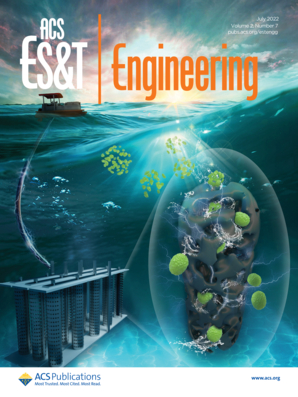ACS ES&T 工程公司 2023 年度卓越回顾奖
IF 7.4
Q1 ENGINEERING, ENVIRONMENTAL
引用次数: 0
摘要
随着 ACS ES&T Engineering 进入第四个出版年头,我们借此机会感谢并庆祝我们敬业的审稿人所做出的卓越贡献。在我们研究团体的共同努力下,该期刊取得了长足的进步,包括今年首次达到 7.4 的期刊影响因子。2023 年,ACS ES&T Engineering 作为环境工程与技术研究的领先平台继续前进。我们出版物的质量以及我们与作者和读者之间建立的信任日益彰显了我们的影响力。这一进步的核心是我们的审稿人,他们的专业评估确保了我们审议的每一篇稿件的严谨性和相关性。我们很高兴向 2023 年度的最佳审稿人致敬,他们的出色工作为同行评审的卓越性树立了新的标准。他们富有洞察力的评论和深思熟虑的建议超越了表面的反馈,在塑造环境工程研究的未来方面发挥了至关重要的作用。他们的奉献精神不仅维护了 ACS ES&T Engineering 的高标准,还培养了严谨诚信的学术文化。2023 年度优秀审稿人奖授予以下优秀审稿人:Wensi Chen,美国德克萨斯 A&M 大学,https://engineering.tamu.edu/civil/profiles/chen-wensi.html Yi-Hsueh Chuang,台湾国立阳明交通大学,https://scholar.nycu.edu.tw/en/persons/yi-hsueh-chuang Dahu Ding,中国南京农业大学,https://www.researchgate.net/profile/Dahu-Ding Dahong Huang,中国科学技术大学,https://ese.ustc.edu.cn/2022/0923/c26804a592604/page.htm Samir Khanal,美国夏威夷大学马诺阿分校,https://www.ctahr.hawaii.edu/depart/mbbe/Khanal.html Choonsoo Kim,大韩民国 Kongju 国立大学,https://scholar.google.de/citations?user=gbTj9OUAAAAJ&hl=en Sunil Kumar,印度国家环境工程研究所,https://www。Researchgate.net/profile/Sunil-Kumar-493 刘宇,新加坡南洋理工大学,https://www.researchgate.net/profile/Yu-Liu-35/5 Kathryn Newhart,美国西点军校,https://www.westpoint.edu/geography-and-environmental-engineering/profile/kate_newhart 孙萌,中国清华大学,https://www.tsinghua.edu.cn/enven/info/1052/2104.htm 王梦晔,中国中山大学,https://www.researchgate.net/profile/Mengye-Wang 王昕,中国南开大学,https://enven.nankai.edu.cn/wx1_en/main.htm 我们期待在各位审稿人的支持下,继续成功发表论文。我们向所有审稿人致以最诚挚的谢意,感谢他们对我们的忠实支持,使我们发表的成果保持了最严谨的科学性,并以这种方式为更广泛的研究界服务为荣。感谢您成为我们期刊发展历程中不可或缺的一部分。ChatGPT 用于改进本社论的语法和流畅性。本文尚未被其他出版物引用。本文章由计算机程序翻译,如有差异,请以英文原文为准。
ACS ES&T Engineering’s 2023 Excellence in Review Awards
As ACS ES&T Engineering has entered its fourth year of publication, we take a moment to acknowledge and celebrate the exceptional contributions of our dedicated reviewers. The journal has made remarkable strides, including achieving its first Journal Impact Factor of 7.4 this year, thanks to the collective efforts of our research community. In 2023, ACS ES&T Engineering continued to advance as a leading platform for environmental engineering and technology research. Our impact is increasingly evident in the quality of our publications and the trust we build with authors and readers. At the heart of this progress are our reviewers, whose expert evaluations ensure the rigor and relevance of every manuscript we consider. We are delighted to honor the best reviewers of 2023, whose exceptional work has set a new standard for excellence in peer review. Their insightful critiques and thoughtful recommendations extend beyond surface-level feedback, playing a crucial role in shaping the future of environmental engineering research. Their dedication has not only upheld the high standards of ACS ES&T Engineering but also fostered a culture of scholarly rigor and integrity. The 2023 Excellence in Review Awards are presented to the following outstanding reviewers: Wensi Chen, Texas A&M University, USA, https://engineering.tamu.edu/civil/profiles/chen-wensi.html Yi-Hsueh Chuang, National Yang Ming Chiao Tung University, Taiwan, https://scholar.nycu.edu.tw/en/persons/yi-hsueh-chuang Dahu Ding, Nanjing Agricultural University, China, https://www.researchgate.net/profile/Dahu-Ding Dahong Huang, University of Science and Technology of China, China, https://ese.ustc.edu.cn/2022/0923/c26804a592604/page.htm Samir Khanal, University of Hawaii at Manoa, USA, https://www.ctahr.hawaii.edu/depart/mbbe/Khanal.html Choonsoo Kim, Kongju National University, Republic of Korea, https://scholar.google.de/citations?user=gbTj9OUAAAAJ&hl=en Sunil Kumar, National Environmental Engineering Research Institute, India, https://www.researchgate.net/profile/Sunil-Kumar-493 Yu Liu, Nanyang Technological University, Singapore, https://www.researchgate.net/profile/Yu-Liu-35/5 Kathryn Newhart, United States Military Academy at West Point, USA, https://www.westpoint.edu/geography-and-environmental-engineering/profile/kate_newhart Meng Sun, Tsinghua University, China, https://www.tsinghua.edu.cn/enven/info/1052/2104.htm Mengye Wang, Sun Yat-Sen University, China, https://www.researchgate.net/profile/Mengye-Wang Xin Wang, Nankai University, China, https://enven.nankai.edu.cn/wx1_en/main.htm We look forward to continuing this successful journey of publication with the support of dedicated reviewers. We extend our warmest appreciation to all of our reviewers for their loyal support in maintaining the fullest scientific rigor in our published outputs and for proudly serving the broader research community in this way. Thank you for being an essential part of our journal’s journey. ChatGPT has been used to improve the grammar and flow of this editorial. This article has not yet been cited by other publications.
求助全文
通过发布文献求助,成功后即可免费获取论文全文。
去求助
来源期刊

ACS ES&T engineering
ENGINEERING, ENVIRONMENTAL-
CiteScore
8.50
自引率
0.00%
发文量
0
期刊介绍:
ACS ES&T Engineering publishes impactful research and review articles across all realms of environmental technology and engineering, employing a rigorous peer-review process. As a specialized journal, it aims to provide an international platform for research and innovation, inviting contributions on materials technologies, processes, data analytics, and engineering systems that can effectively manage, protect, and remediate air, water, and soil quality, as well as treat wastes and recover resources.
The journal encourages research that supports informed decision-making within complex engineered systems and is grounded in mechanistic science and analytics, describing intricate environmental engineering systems. It considers papers presenting novel advancements, spanning from laboratory discovery to field-based application. However, case or demonstration studies lacking significant scientific advancements and technological innovations are not within its scope.
Contributions containing experimental and/or theoretical methods, rooted in engineering principles and integrated with knowledge from other disciplines, are welcomed.
 求助内容:
求助内容: 应助结果提醒方式:
应助结果提醒方式:


